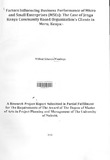| dc.description.abstract | Micro and small enterprises act as providers for goods and services, facilitate transfer of technology, create employment and create wealth. They are also credited with creating over 80% of all new jobs in Kenya and providing a brooding ground for Small and Medium Enterprises with the hope that the enterprises grow to big businesses. The Government of Kenya and other development agencies have put resources to harness the potential presented by these enterprises with the aim of reducing poverty, while creating employment and wealth. Besides these benefits, most of the Micro and Small Enterprises (MSEs) do not survive to their fifth year while others stagnate and are not able to generate permanent and highly remunerative jobs due to numerous challenges they encounter, including competition, low capitalization, insecurity, unskilled management among others.
The main objective of this study was to relate Business Performance of MSEs as the dependent Variable to factors that influence it including Demographics, Training on Business Skills and Access to Credit as the Dependent Variables. This study focused on Jenga Kenya clients who operate their MSEs in six districts around Meru town in Eastern Province. This study used descriptive survey design with confidence level set at 95% and the margin level set at 4%. The total population of Jenga Kenya clients being 422 from which sample of 248 respondents were surveyed using questionnaires.
To capture the richness in diversity of the population, stratified disproportionate random sampling was employed using the districts as the strata. The data collected was cleaned, organized, coded and SPSS was used in to analyze the data. The findings were presented in Tables and percentages. The study found that; Training on Business Skills and Access to Credit significantly influenced Business Performance of MSEs. It also established that Micro-Finance Institutions were accessible to entrepreneurs of both Gender and was more favorable to women than men.
Majority of those accessing training and credit from Jenga Kenya C.B.O. were based in the rural areas and most were operating farm based enterprises. The study also found out that 'terms and conditions' of lending in Micro-Finance Institutions was not a hindrance to entrepreneurs operating MSEs and most of them classified the 'terms and conditions' of borrowing as favorable and acceptable. This study proposes formulation of a curriculum for entrepreneurs running MSEs since most entrepreneurs had practiced the skills they had learned from the trainings offered.
Growth of micro and small enterprises in the rural areas should be encouraged since this shall not only provide goods and services to those dwelling in those areas, they also provide an avenue for technology transfer, create wealth, reduce rural urban migration by raising the standards of living and creating opportunities in the rural areas but most of all, reduce poverty and contribute to the GDP
of the country. | en_US |

